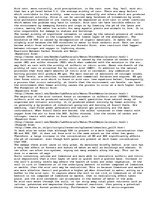Economic Possibilities for our Grandchildren (1930).
My purpose in this essay, however, is not to examine the present or the near future, but to disembarrass myself of short views and take wings into the future. What can we reasonably expect the level of our economic life to be a hundred years hence? What are the economic possibilities for our grandchildren?
John Maynard Keynes is widely regarded as one of the most influential economists of the 20th century. In 1930, he wrote Economic Possibilities for our Grandchildren. Now 88 years later, it’s fascinating to look at what predictions he got right and where he missed the mark.

In his 1930 essay,Economic Possibilities for our Grandchildren, John Maynard Keynes joined a large group of distinguished thinkers who have predicted that people would experience great difficulty filling their days once productivity increases eliminated the necessity to spend more than a token amount of time working. These fears seem unfounded.

Keynes and our grandchildren: Recapturing an alternative vision of economic progress. Measuring the modern economy against the predictions of John Maynard Keynes’ landmark 1930 essay, Paul Mason explores the promises of Keynes’ vision and the reasons why reality has fallen short.

John Maynard Keynes, the most influential economist of the twentieth century, published his forecast, “Economic Possibilities for Our Grandchildren,” in 1930, when the world was in the grip of the Great Depression. He posited that the depression would not signal the end of the industrial revolution as some feared at the time, but would.

I n his 1930 essay “Economic Possibilities for Our Grandchildren,” the economist John Maynard Keynes predicted a 15-hour workweek in the 21st century, creating the equivalent of a five-day.

In his 1930 essay Economic Possibilities for our Grandchildren, the British economist John Maynard Keynes predicted that technological advancements would mean that future generations would work no.

And John Maynard Keynes wrote, in his 1930 essay Economic Possibilities for our Grandchildren, that within 100 years the “economic problem” would be solved. In 2030 we would all be working “three-hour shifts or a fifteen-hour week” and.

In his 1930 essay “Economic Possibilities for our Grandchildren,” he predicted that all major economic problems would be “solved” within a hundred years, and we would only have to figure out how to pass the time. But he failed to anticipate that economic problems would continuously evolve. For example, business strategies are constantly.

In his 1930 essay Economic Possibilities for Our Grandchildren, economist John Maynard Keynes predicted that in 100 years everyone could be working just 15 hours a week. Recent developments could be a step in that direction. The four-day work week has been billed as the future of work, with several.

I’m not the first to attempt a hundred-year forecast. John Maynard Keynes did so in his 1930 essay, “Economic Possibilities for Our Grandchildren”, noting that on average we might expect to be eight times richer in 2030 than a century earlier. We will fall somewhat short of that, but not by much.

Leading economists revisit a provocative essay by John Maynard Keynes, debating Keynes's vision of growth, inequality, work, leisure, entrepreneurship, consumerism, and the search for happiness in the twenty-first century. In 1931 distinguished economist John Maynard Keynes published a short essay, “Economic Possibilities for Our Grandchildren,” in his collection Essays in Persuasion. In.

Keynes is best known for his subsequent seminal work on business cycles, and just like there where economic policy could be used to achieve better economic outcomes, he was optimistic about humanity. In his 1930 essay, “Economic Possibilities for.



